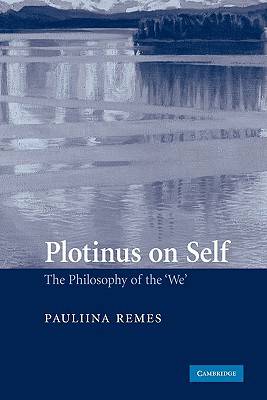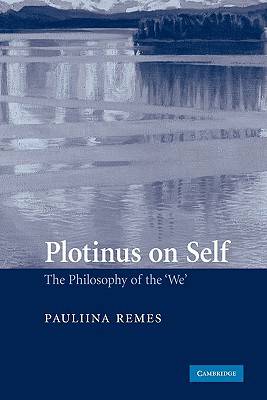
Door een staking bij bpost kan je online bestelling op dit moment iets langer onderweg zijn dan voorzien. Dringend iets nodig? Onze winkels ontvangen jou met open armen!
- Afhalen na 1 uur in een winkel met voorraad
- Gratis thuislevering in België vanaf € 30
- Ruim aanbod met 7 miljoen producten
Door een staking bij bpost kan je online bestelling op dit moment iets langer onderweg zijn dan voorzien. Dringend iets nodig? Onze winkels ontvangen jou met open armen!
- Afhalen na 1 uur in een winkel met voorraad
- Gratis thuislevering in België vanaf € 30
- Ruim aanbod met 7 miljoen producten
Zoeken
€ 72,45
+ 144 punten
Uitvoering
Omschrijving
Plotinus, the founder of the Neoplatonic school of philosophy, conceptualises two different notions of self (or 'us'): the corporeal and the rational. Personality and imperfection mark the former, while goodness and a striving for understanding mark the latter. In this text, Dr Remes grounds the two selfhoods in deep-seated Platonic ontological commitments, following their manifestations, interrelations and sometimes uneasy coexistence in philosophical psychology, emotional therapy and ethics. Plotinus' interest lies in what it means for a human being to be a temporal and a corporeal thing, yet capable of abstract and impartial reasoning, of self-government and perhaps even invulnerability. The book argues that this involves a philosophically problematic rupture within humanity which is, however, alleviated by the psychological similarities and points of contact between the two aspects of the self. The purpose of life is the cultivation of the latter aspect, the true self.
Specificaties
Betrokkenen
- Auteur(s):
- Uitgeverij:
Inhoud
- Aantal bladzijden:
- 298
- Taal:
- Engels
Eigenschappen
- Productcode (EAN):
- 9780521204989
- Verschijningsdatum:
- 28/04/2011
- Uitvoering:
- Paperback
- Formaat:
- Trade paperback (VS)
- Afmetingen:
- 152 mm x 229 mm
- Gewicht:
- 439 g

Alleen bij Standaard Boekhandel
+ 144 punten op je klantenkaart van Standaard Boekhandel
Beoordelingen
We publiceren alleen reviews die voldoen aan de voorwaarden voor reviews. Bekijk onze voorwaarden voor reviews.











